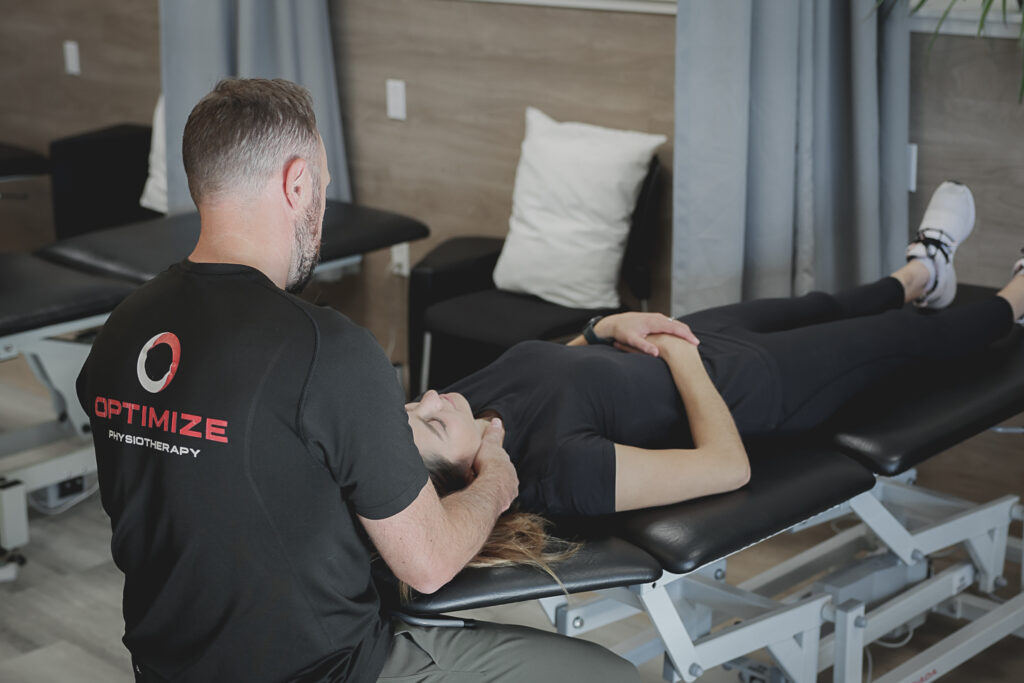How Concussion Rehab Improves Safety and Efficiency to Return to Sport

After an injury, athletes often come into the clinic to recover from the sprain, strain, or break. While getting you back to peak performance is our goal, Concussion Assessment and Treatment are other aspects of recovery we often look at.
For anyone active in sports, whether competitive or not, there is a risk of injury to both the body and the brain. Team Optimize is here to help you through both types of injuries.
In this blog post, we’ll explore a concussion assessment, talk about why it’s important, discuss the significance of baselines, and share some eye-opening facts about concussions that every athlete should be aware of.
Before that, let’s start with the basics:
What is a concussion?
By definition, a concussion is a functional mild traumatic brain injury (mTBI) caused by a bump, blow or jolt to the head that causes the head and brain to move back and forth rapidly. A concussion can also be caused by a hit to the body that causes a rapid back-and-forth motion in the head and brain.
With sufficient enough speed, this rapid movement can cause an immediate and excessive spike in brain stimulation, making bodily function or communication difficult. While concussions are usually not life-threatening, they are essential to treat.
concussion symptoms
The symptoms of a concussion vary from person to person, but some of the most common symptoms are:
- dizziness, nausea, or headache
- neck pain
- balance problems
- amnesia, forgetfulness, or difficulties paying attention
- loss of consciousnesses
- sleep troubles, sleeping too much, or not able to sleep
- vomiting
- anxiety and panic attacks
Concussion symptoms can manifest differently in each individual. While some may experience immediate symptoms, others might have a delayed onset. Understanding this variability highlights the importance of comprehensive concussion testing.
Understanding Concussion Assessment
Concussion assessments involve a series of evaluations to test an athlete’s cognitive function, balance, and other neurological factors. These tests identify signs of a concussion, even in the absence of visible head trauma. They play a key role in ensuring the prompt detection and appropriate management of concussions.
Why Concussion Testing is Important
- Early Detection and Treatment: Timely identification of a concussion allows for prompt medical intervention, reducing the risk of long-term consequences and ensuring a timely and appropriate return to activity or sport. Concussion testing enables healthcare professionals to detect subtle signs that may not be immediately apparent, providing a comprehensive approach to care.
- Preventing Second-Impact Syndrome: Engaging in sports with an undiagnosed concussion or returning too early puts athletes at risk of second-impact syndrome. This rare but life-threatening condition occurs when a second Concussion is sustained before the first has fully healed. Concussion testing helps prevent this dangerous scenario.
Why a Baseline Concussion Test Matters to Athletes
Baseline Concussion Testing involves establishing a pre-season or pre-injury assessment of an athlete’s cognitive and physical functions. This baseline becomes a crucial reference point for comparison in the event of a suspected concussion. The benefits include:
- Personalized Recovery Plans: Baseline testing provides a personalized benchmark, allowing us to tailor recovery plans based on an individual athlete’s abilities and characteristics.
- Objective Assessment: With baseline data, we can objectively measure changes in an athlete’s cognitive function and balance, enhancing the accuracy of concussion diagnoses and management.
Did You Know That No Direct Head Contact is Required to Get a Concussion?
Contrary to common belief, a concussion can occur without a direct blow to the head. The rapid acceleration and deceleration of the brain within the skull, often caused by sudden changes in motion, can lead to a concussion.
A Commitment to Athlete Well-Being
Concussion testing is critical for the health of an athlete. Athletes and parents of child athletes should view it as an essential aspect of responsible sports participation.
At Optimize, we have physiotherapists licensed in Complete Concussion Training. This comprehensive and ongoing training allows our practitioners to be up-to-date on the latest developments in all aspects of concussions. Their training includes learning Complete Concussion’s assessment, treatment and return to sport protocols, some of the most widely used and researched tests and treatments for concussion management. Their evidence-based approach to treating concussions provides for the management of concussions and returning to work, play, or learning after a concussion.
To learn more about our Concussion testing and rehab services, please call us at 780-455-5068 or book your appointment online.